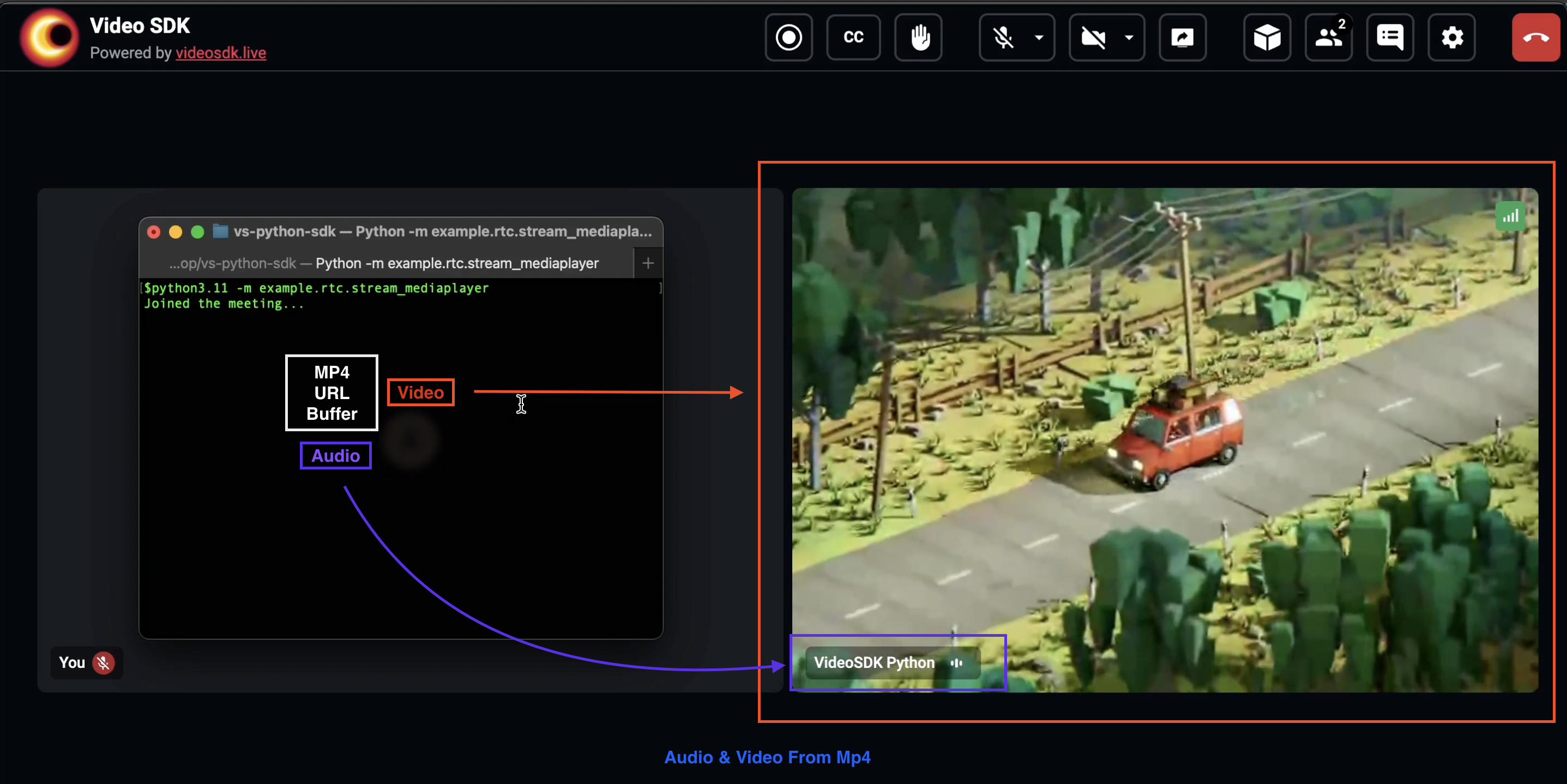Custom Video Track | Python
In VideoSDK, you can ingest a custom video track from a file into your meeting using a CustomVideoTrack.
This example demonstrates how to create a custom video track from MP4 file and integrate it into a VideoSDK meeting.

Requirements
- Python 3.11+
- videosdk Python library
avlibrary for handling video framesasynciofor asynchronous operations
Setup
Before running the example, ensure you have set up your environment variables for VideoSDK authentication:
VIDEOSDK_TOKEN = "<VIDEOSDK_TOKEN>"
MEETING_ID = "<MEETING_ID>"
NAME = "<NAME>"
Custom Video Track Class
The VideoFileTrack class extends CustomVideoTrack to handle video stream ingestion from an MP4 file:
import av
import time
import fractions
import asyncio
from av import VideoFrame
from vsaiortc.mediastreams import MediaStreamError
from videosdk import CustomVideoTrack, MeetingConfig, VideoSDK, Participant, MeetingEventHandler, ParticipantEventHandler
VIDEOSDK_TOKEN = "VIDEOSDK_TOKEN"
MEETING_ID = "MEETING_ID"
NAME = "NAME"
loop = asyncio.get_event_loop()
class VideoFileTrack(CustomVideoTrack):
"""
A video track that plays a video file in a continuous loop.
"""
def __init__(self, path: str):
super().__init__() # Initialize the parent class
self.kind = "video"
self.path = path
self.container = av.open(path)
self.stream = self.container.streams.video[0]
self._start = time.time()
self._timestamp = 0
async def recv(self) -> VideoFrame:
"""
Receive the next :class:`~av.video.frame.VideoFrame`.
"""
# implementing in next step
VideoFileTrack.recv()
Purpose:
The recv method in VideoFileTrack class retrieves the next video frame from the source(file, Url, Buffer, or any).
Key Components:
- Timestamp Management: Manages the delivery of video frames based on calculated timestamps (
pts) and time base (time_base). - Packet Decoding: Iterates through packets and decodes video frames until a valid frame is obtained.
- Error Handling: Handles end-of-stream by seeking back to the beginning of the file (
self.container.seek(0)) to loop the video.
Code Snippet:
async def recv(self) -> VideoFrame:
"""
Receive the next :class:`~av.video.frame.VideoFrame`.
"""
# Timestamp Management
pts, time_base = await self.next_timestamp()
# Packet Decoding & Error Handling
# Read next frame from the video file
frame = None
for packet in self.container.demux(self.stream):
try:
for video_frame in packet.decode():
frame = video_frame
break
if frame:
break
except EOFError:
self.container.seek(0)
finally:
pass
frame.pts = pts
frame.time_base = time_base
return frame
async def next_timestamp(self) -> Tuple[int, fractions.Fraction]:
VIDEO_PTIME = 1 / 30 # Packet time for 30fps
VIDEO_CLOCK_RATE = 90000 # Clock rate for video
VIDEO_TIME_BASE = fractions.Fraction(1, VIDEO_CLOCK_RATE)
if self.readyState != "live":
raise MediaStreamError
if hasattr(self, "_timestamp"):
self._timestamp += int(VIDEO_PTIME * VIDEO_CLOCK_RATE)
wait = self._start + (self._timestamp /
VIDEO_CLOCK_RATE) - time.time()
await asyncio.sleep(max(0, wait))
else:
self._start = time.time()
self._timestamp = 0
return self._timestamp, VIDEO_TIME_BASE
Event Handlers
Define custom event handlers to handle meeting and participant events:
class MyMeetingEventHandler(MeetingEventHandler):
def on_meeting_joined(self, data):
print("Meeting joined")
def on_meeting_left(self, data):
print("Meeting left")
class MyParticipantEventHandler(ParticipantEventHandler):
def __init__(self, participant_id: str):
super().__init__()
self.participant_id = participant_id
def on_stream_enabled(self, stream):
print(f"Participant {self.participant_id} stream enabled: {stream.kind}")
def on_stream_disabled(self, stream):
print(f"Participant {self.participant_id} stream disabled: {stream.kind}")
- You can learn more about MeetingEventHandler & ParticipantEventHandler class in upcoming guide.
Main Function
Configure and run the main function to initialize the meeting with the custom video track:
def main():
# Initialize custom video track
video_track = VideoFileTrack("./example-video.mp4")
# Configure meeting
meeting_config = MeetingConfig(
meeting_id=MEETING_ID,
name=NAME,
mic_enabled=False,
webcam_enabled=True,
token=VIDEOSDK_TOKEN,
custom_camera_video_track=video_track
)
# Initialize VideoSDK meeting
meeting = VideoSDK.init_meeting(**meeting_config)
# Add event listeners
meeting.add_event_listener(MyMeetingEventHandler())
meeting.local_participant.add_event_listener(MyParticipantEventHandler(participant_id=meeting.local_participant.id))
# Join the meeting
print("Joining the meeting...")
meeting.join()
print("Meeting setup complete")
if __name__ == '__main__':
main()
loop.run_forever()
Conclusion
This setup demonstrates how to integrate a custom video track from an MP4 file into a VideoSDK meeting, with event handling for meeting and participant interactions.
API Reference
Refer to the following API documentation for methods and events used in this guide:
Got a Question? Ask us on discord

